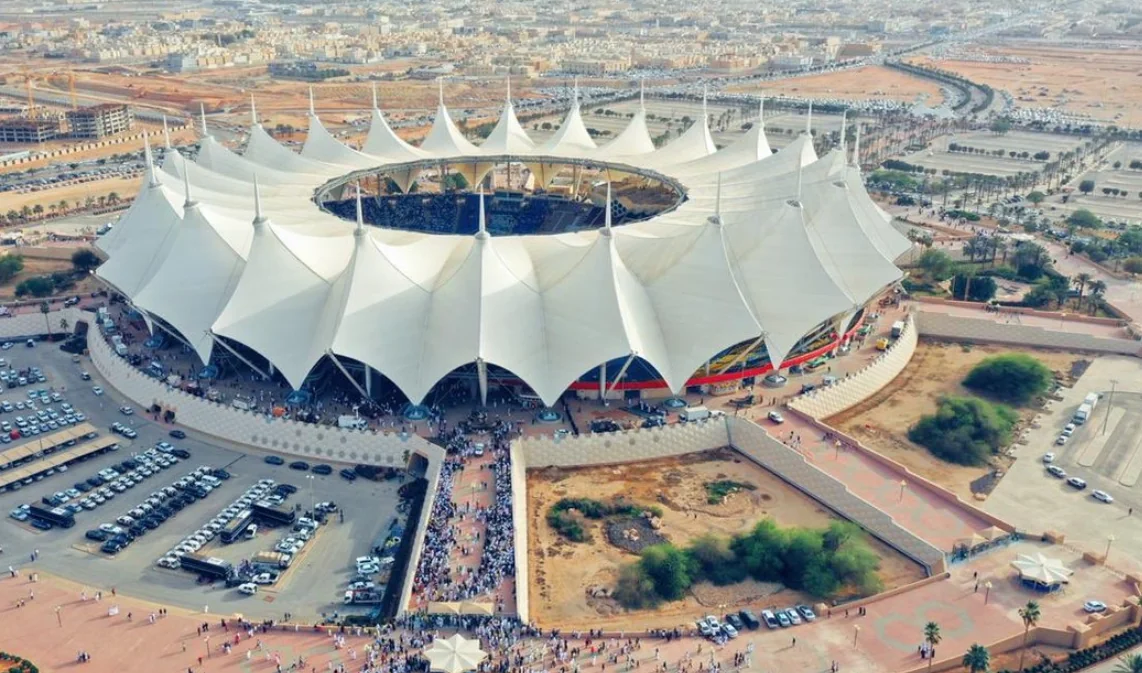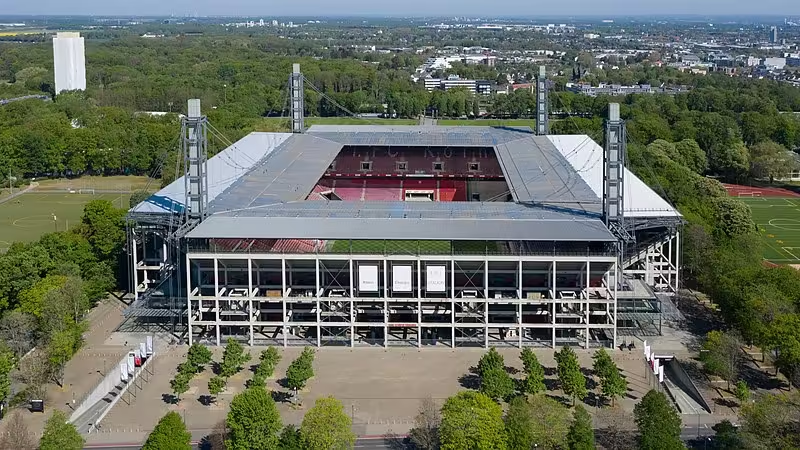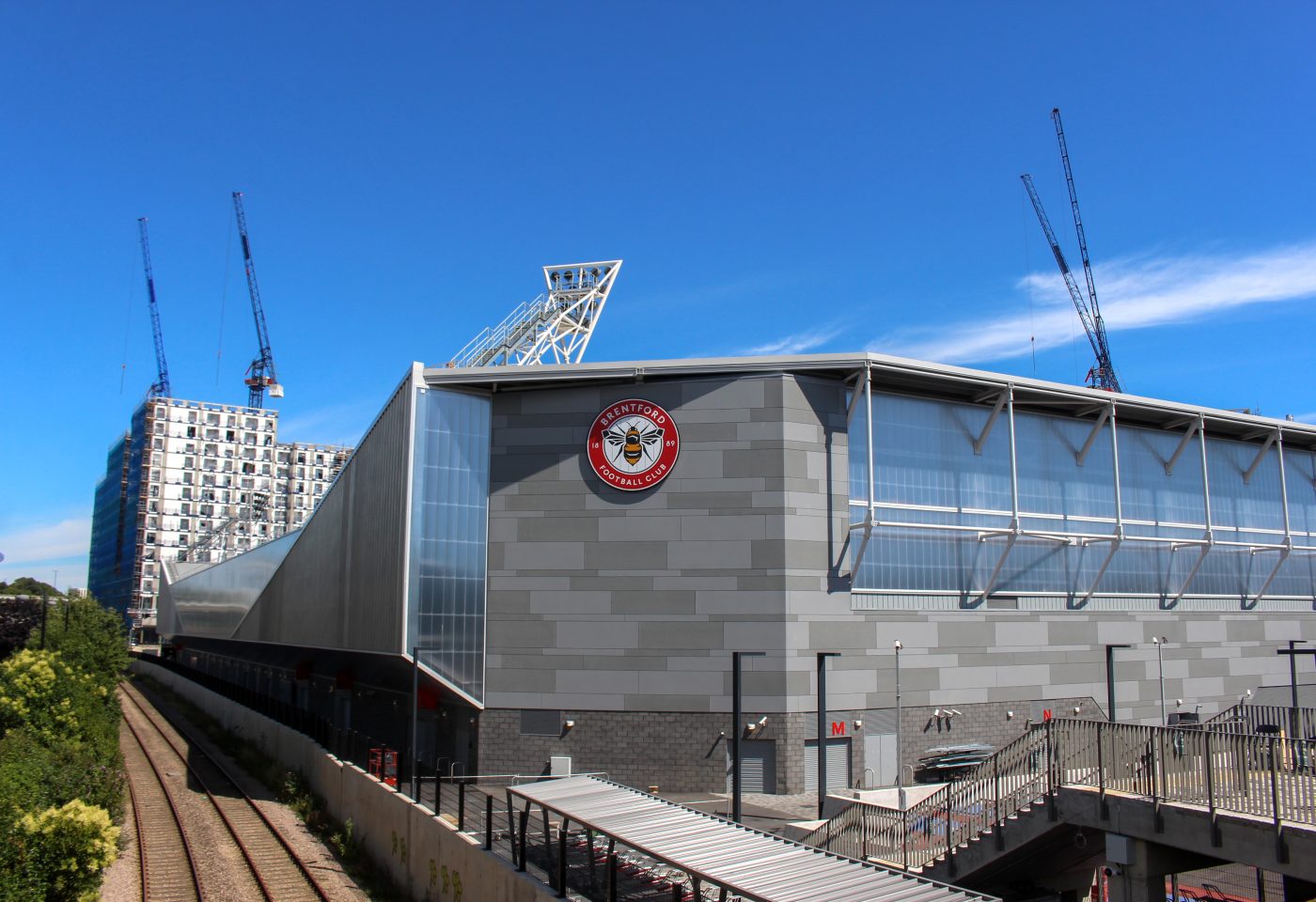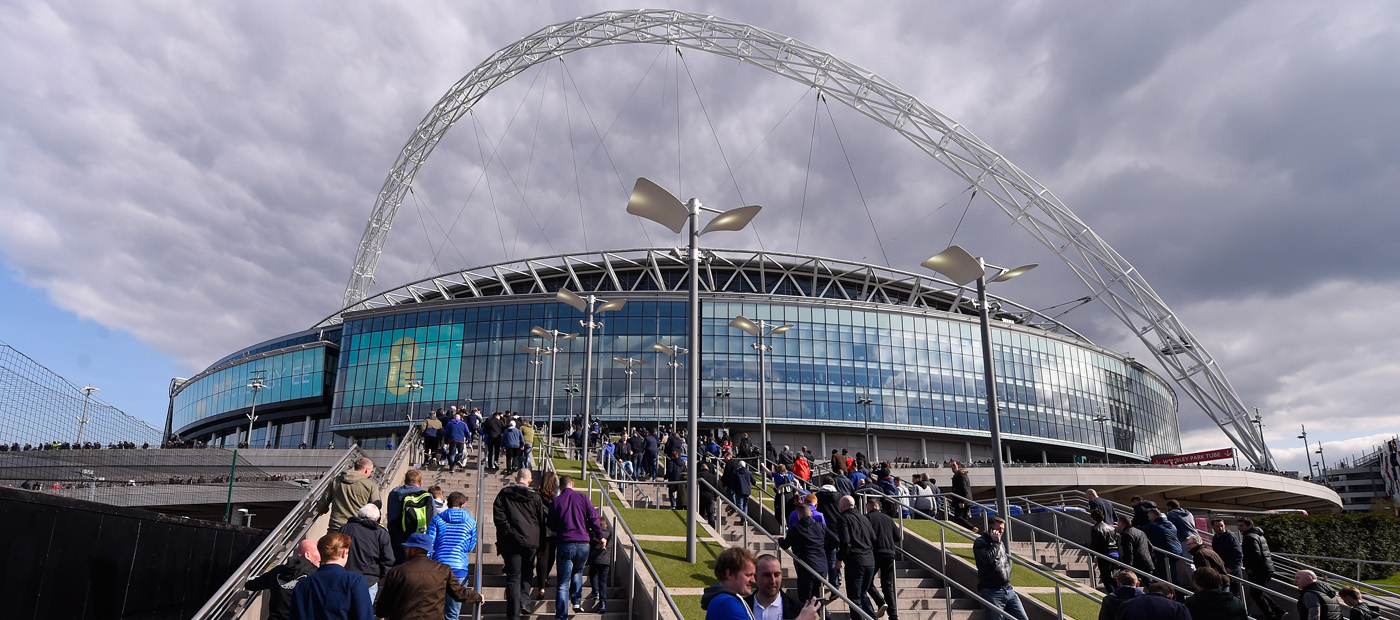King Fahd Sports City Stadium in Riyadh, Saudi Arabia is a multi-purpose stadium that has hosted some of the biggest football matches and events in the world. The stadium is known for its unique architecture and design, which includes a massive tent-like roof that covers the entire stadium. The stadium is currently closed for reconstruction that will expand its seating capacity to approximately 92,000 spectators.
The stadium was built in 1987 and was named after King Fahd bin Abdulaziz Al Saud, the former King of Saudi Arabia. Since then, it has been the home ground of the Saudi Arabian national football team and has hosted numerous domestic and international football matches, including the 1989 FIFA World Youth Championship, the 1996 AFC Asian Cup, and the 2019 Italian Super Cup. In addition to football, the stadium has also hosted concerts, religious events, and other cultural events.
Key Takeaways
-
- King Fahd Sports City Stadium is a multi-purpose stadium in Riyadh, Saudi Arabia that is known for its unique architecture and design.
- The stadium has hosted numerous domestic and international football matches, as well as other cultural events.
- The stadium is currently closed for reconstruction that will expand its seating capacity to approximately 92,000 spectators.
History and Development
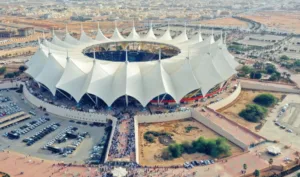
Construction and Inauguration
King Fahd Sports City Stadium Riyadh, also known as “The Tent” or “Pearl of Stadiums,” is a multi-purpose stadium located in Riyadh, Saudi Arabia. The stadium was constructed in 1987 under the orders of King Fahd bin Abdulaziz Al Saud, who was then the Crown Prince. The construction of the stadium was aimed at promoting sports and physical activities in the country.
The stadium, which initially seated 58,398 spectators, was built at a cost of $450 million. It was inaugurated on May 1, 1987, with a grand ceremony that was attended by several dignitaries, including King Fahd himself. The inaugural event was a football match between the national teams of Saudi Arabia and Uruguay.
Renovations and Upgrades
Since its construction, King Fahd Sports City Stadium has undergone several renovations and upgrades to keep up with modern standards. In 2012, the stadium was closed for reconstruction that would expand its seating capacity to approximately 92,000 spectators. The renovation was aimed at making the stadium a world-class facility that would meet the requirements of international sporting events.
The renovation project included the installation of a new roof, new seating arrangements, and the construction of new facilities such as VIP lounges, restaurants, and parking spaces. The project also involved the installation of a new state-of-the-art lighting system that would enhance the viewing experience for spectators.
The renovations and upgrades were completed in 2014, and the stadium was reopened with a grand ceremony that was attended by several dignitaries, including Prince Faisal bin Bandar Al Saud, the Governor of Riyadh. Since then, King Fahd Sports City Stadium has hosted several international sporting events, including football matches, athletics competitions, and concerts.
Architecture and Design
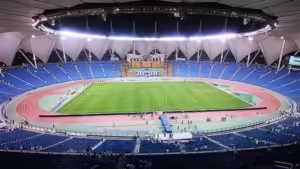
Stadium Structure
King Fahd Sports City Stadium in Riyadh, Saudi Arabia is an impressive multi-purpose stadium with a unique and iconic design. The stadium’s most notable feature is its distinctive retractable roof, which is shaped like a traditional Bedouin tent. The roof is made of a lightweight fabric that allows natural light to filter through during the day and is illuminated at night, creating a stunning visual effect.
The stadium’s exterior is made of steel and glass, creating a modern and futuristic look. The stadium’s design was inspired by the traditional architecture of the region, with the tent-like roof and the use of geometric patterns and Islamic motifs in the stadium’s interior.
Seating Capacity
King Fahd Sports City Stadium has a seating capacity of approximately 92,000, making it one of the largest stadiums in the world. The stadium’s seating is divided into three tiers, with the lower tier being closest to the field and the upper tier offering panoramic views of the stadium and the surrounding city.
The stadium’s seating is designed to provide maximum comfort and convenience to spectators, with ample legroom and easy access to concessions, restrooms, and other amenities.
Facilities and Amenities
King Fahd Sports City Stadium is equipped with state-of-the-art facilities and amenities, including VIP lounges, luxury suites, and private boxes. The stadium also features a variety of food and beverage options, ranging from traditional Saudi cuisine to international favorites.
In addition to its impressive seating capacity and modern amenities, King Fahd Sports City Stadium is also known for its advanced technology and security features. The stadium is equipped with a sophisticated surveillance system and a network of sensors that monitor the stadium’s environment and detect any potential safety hazards.
Overall, King Fahd Sports City Stadium is a stunning example of modern sports architecture and design, combining traditional elements with cutting-edge technology and amenities to provide spectators with an unforgettable experience.
Major Events
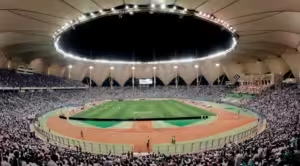
King Fahd Sports City Stadium in Riyadh has been a popular venue for various events since its opening in 1987. The stadium has hosted numerous sporting events, concerts, and other forms of entertainment.
Sporting Competitions
King Fahd Sports City Stadium has hosted several international sporting events, including the FIFA Confederations Cup in 1992 and 1995, the AFC Asian Cup in 1988 and 1996, and the Gulf Cup of Nations in 1996 and 2014. The stadium has also been used for domestic football matches, including the finals of the Saudi Professional League, the King’s Cup, and the Crown Prince Cup.
In addition to football, the stadium has hosted other sporting events such as athletics, wrestling, and boxing. The stadium’s track and field facilities have been used for national and international athletic competitions, including the Arab Games in 1985 and the Asian Athletics Championships in 1992.
Concerts and Entertainment
Apart from sporting events, King Fahd Sports City Stadium has also been a popular venue for concerts and other forms of entertainment. The stadium has hosted several famous artists and bands, including Michael Jackson, Mariah Carey, and the Rolling Stones.
In recent years, the stadium has been used for various cultural and entertainment events, including the Riyadh Season, a two-month festival held in late 2019 that featured concerts, theatrical performances, and other forms of entertainment. The stadium’s facilities have also been used for exhibitions, conferences, and other events.
Overall, King Fahd Sports City Stadium has been a versatile venue for various events, attracting both local and international audiences. Its state-of-the-art facilities and central location make it an ideal venue for hosting major events in Riyadh.
Location and Accessibility
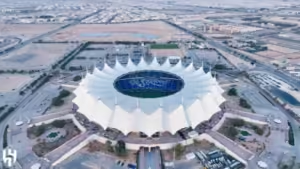
King Fahd Sports City Stadium Riyadh is located in the heart of Riyadh, the capital city of Saudi Arabia. The stadium is situated in the As Sulimaniyah district, which is known for its vibrant atmosphere and modern infrastructure. The stadium is easily accessible by car, public transportation, and taxi.
Transportation Links
The stadium is well-connected to the rest of the city through a network of roads and highways. Visitors can reach the stadium by taking the King Fahd Road, which is one of the main highways in Riyadh. The stadium is also accessible via public transportation, with several bus routes passing through the area. Visitors can take the bus to the nearby Sulimaniyah Metro Station, which is located just a short walk away from the stadium.
Parking and Infrastructure
The stadium has ample parking space for visitors, with several parking lots located around the stadium. Visitors can park their cars in one of the designated parking lots and then walk to the stadium. The stadium also has several entrances and exits, which are designed to handle large crowds efficiently. The stadium is equipped with modern infrastructure, including state-of-the-art lighting and sound systems, which provide an immersive experience for visitors.
Overall, King Fahd Sports City Stadium Riyadh is a modern, well-equipped stadium that is easily accessible by car, public transportation, and taxi. Visitors can enjoy a hassle-free experience when visiting the stadium, thanks to its convenient location and modern infrastructure.
Economic and Cultural Impact
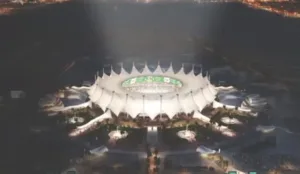
Local Economy Boost
King Fahd Sports City Stadium in Riyadh has had a significant impact on the local economy since its construction in 1987. The stadium has played host to major sporting events, including the 7th FIFA World Youth Championship in 1989, and has attracted large numbers of visitors to the city. This has led to the development of new hotels, restaurants, and other businesses in the area, creating jobs and boosting the local economy.
In addition to the economic benefits, the stadium has also had a positive impact on the city’s infrastructure. The construction of the stadium required significant investment in transportation and other infrastructure, which has helped to improve the city’s overall infrastructure and connectivity.
Cultural Significance
King Fahd Sports City Stadium is not only an important sporting venue but also a symbol of Saudi Arabia’s progress and modernization. The stadium’s unique design, which includes a distinctive tent-like roof, is a testament to the country’s cultural heritage and its commitment to modern architecture.
The stadium has also played an important role in promoting sports and physical activity in the country. The stadium hosts a variety of sporting events, including football, athletics, and basketball, and has helped to inspire a new generation of athletes in the country.
Overall, King Fahd Sports City Stadium has had a significant impact on both the local economy and culture of Riyadh. Its unique design and cultural significance have helped to put Saudi Arabia on the map as a modern and progressive country, while its role as a major sporting venue has helped to promote sports and physical activity in the country.
Frequently Asked Questions
How can I purchase tickets for events at King Fahd Sports City Stadium?
Tickets for events at King Fahd Sports City Stadium can be purchased online or at the stadium box office. It is recommended to purchase tickets in advance to avoid long lines and ensure availability. Ticket prices vary depending on the event and seating location.
What is the seating capacity of King Fahd Sports City Stadium?
King Fahd Sports City Stadium has a seating capacity of approximately 92,000 after undergoing a recent renovation. It is one of the largest stadiums in the world and is capable of hosting major international events.
Where is King Fahd Sports City Stadium located?
King Fahd Sports City Stadium is located in Riyadh, the capital city of Saudi Arabia. The stadium is easily accessible by car or public transportation and is located near several major highways.
Is there a seating chart available for King Fahd Sports City Stadium?
Yes, a seating chart is available for King Fahd Sports City Stadium. The seating chart can be found on the official stadium website or by contacting the stadium box office. The seating chart provides a detailed view of the stadium layout and seating sections.
What are the recent upgrades or renovations done to King Fahd Sports City Stadium?
King Fahd Sports City Stadium underwent a major renovation in recent years to expand its seating capacity and upgrade its facilities. The renovation included the addition of new seating sections, a new roof, and improved amenities for spectators.
How does King Fahd Sports City Stadium compare to other major stadiums in Saudi Arabia in terms of size?
King Fahd Sports City Stadium is one of the largest stadiums in Saudi Arabia and the world. It is capable of hosting major international events and has a larger seating capacity than many other stadiums in the region.
Also Read:
Chase Stadium: Inter Miami’s New Home Stadium
Mercedes-Benz Arena Stadium in Germany: A World-Class Sporting Venue
Red Bull Arena RB Leipzig Stadium: All You Need to Know
Volksparkstadion: History, Capacity, and Location
